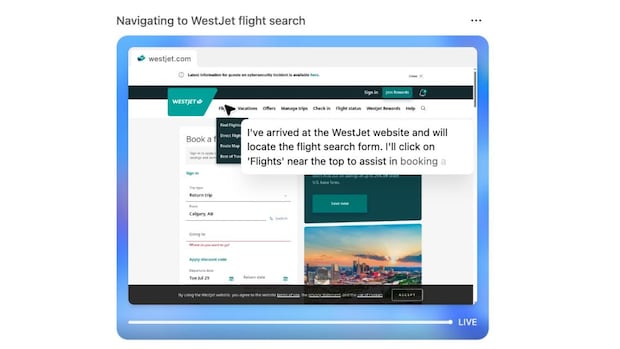The release of a new set of tools for getting information and accomplishing tasks online promises to reinvent traditional search and take AI chatbots to the next level. But it comes with significant questions about reliability and security.
OpenAI, makers of the popular ChatGPT AI-powered chatbot, began rolling out ChatGPT Agent earlier this month, and other major AI players are coming out with similar tools. They’re banking that users will buy into agentic AI, a technology designed to be a virtual personal assistant, or, as it’s now known, an AI agent.
“So an AI agent largely takes autonomous action based on the goal that you give it,” said Canadian futurist Sinead Bovell, in an interview with CBC News.
“You don’t have to tell it how it should then go find information, make a plan, book a flight and so forth,” said Bovell, the founder of the tech education company WAYE, which advises organizations on emerging technologies.
What are AI agents?
ChatGPT Agent, which is currently only available to most paid subscribers, brings together two tools OpenAI has been developing: Deep Research, an advanced search tool already in use in ChatGPT, and Operator, which is supposed to complete online tasks for users by interacting with websites.
Users access the agent through the familiar ChatGPT chatbot, but ChatGPT Agent works away on your screen through its own virtual browser and computer.
The general goal with agentic AI is to accomplish online tasks in a more natural and efficient way.
For example, rather than spending hours combing through different airline websites trying to find the least expensive flight, using an AI agent would be like interacting with a trusted administrative assistant who does the tedious searching for you, then presents you with the best options.
The agentic AI gold rush
Agentic AI has been generating lots of heat in AI circles, with a number of big players chasing it.
“AI agents are seen as kind of the next step in the evolution towards an AI-first society, or the AI age,” said Bovell. “So in some ways, they are the holy grail, and where the big competition lies.”
Google, for instance, has been developing its Project Mariner AI agent, which it announced in late 2024. In May, Google said it would be available for those in the U.S. who paid for its highest AI tier.
Sundar Pichai, CEO of Google and Alphabet, said at a Google keynote in May that the company has made a lot of progress since.
Columnists from CBC RadioHow we shop, travel, and manage our money is changing with Agentic AI
Personal finance columnist Rubina Ahmed-Haq says Agentic AI is the next iteration of artificial intelligence, and it can operate with minimal human intervention. Would you allow an AI Agent to manage your money independently?
“First, we are introducing multitasking, and it can now oversee up to 10 simultaneous tasks. Second, it’s using a feature called Teach and Repeat. This is where you can show it a task once, and it learns a plan for similar tasks in the future.”
Perplexity, an AI-based search engine company, released its agentic browser, Comet, earlier in July, featuring Comet Assistant. Comet is available to select paid subscribers. There are other, smaller companies working in the agentic space as well.
The reliability factor
As anyone who has used AI chatbots can attest, these systems do make mistakes. So what does that mean for the reliability of tools that are meant to undertake tasks on your behalf?
“Every time an AI agent does something, like book a flight, fill out a form, construct a webpage, or answer an email for you, it needs a pretty precise understanding of what’s going on,” explained cognitive scientist, author and AI entrepreneur, Gary Marcus, via email.

“Even a tiny slip-up, like booking the wrong nonrefundable ticket, can be costly,” he said.
“The reality is that these systems say stuff that kinda sounds right, because they model how humans talk, but the detail is often wrong.”
Guardrails
In launching its ChatGPT Agent, OpenAI itself cautioned about the problem of errors, or the risk that the agent could be misled.
At the July 17 launch, OpenAI researcher Casey Chu gave an example of an AI agent that might stumble upon a malicious website that asks it to enter credit card information.
“An agent which is trained to be helpful might decide that’s a good idea. We’ve done a lot of work to try to ensure that this doesn’t happen. We’ve trained our model to ignore suspicious instructions on suspicious websites.”
When using AI agents, users will need to have control that allows them to intervene, correct and verify so they don’t undertake harmful steps. We can already see how that’s playing out.
ChatGPT Agent, for instance, has Takeover mode, which allows the user to manually enter credit card information. Chu also noted that the agent will “ask you for confirmation at the last step.”
Still, some have deep security concerns. In March, Meredith Whittaker, president of the privacy-focused messaging app Signal, told an audience at the SXSW tech conference “there’s a profound issue with security and privacy” in using agentic AI.
For an AI agent to be really useful as a personal assistant, it would need to access things like your calendar, your contacts, your email.
A group of Calgary high school students is offering free courses on artificial intelligence to younger students. The classes are open to kids in grades seven to 10, take place at the University of Calgary library, and aim to teach students how to responsibly use AI tools like ChatGPT.
The end of Googling?
Google has a lot to win or lose in the agentic AI fight, since it’s been the dominant player in how people get information online for so long. AI seems to be at the core of its strategy to stay ahead of its competitors.
Google has started rolling out AI Mode, which incorporates more AI-driven features that allow users to do things like ask longer and more complex queries. Its AI agent Project Mariner is supposed to be included in AI Mode down the road.
While Google made its name helping human users get information quickly and easily, how we get information is changing.
Bovell says current internet browsers aren’t designed for the age of AI.

“They are designed for human traffic. Human viewers, humans looking at certain web pages,” she said.
“We have reached the beginning of the end of humans being the primary users of the internet.”
New research from The Pew Research Center suggests people reading Google’s AI overviews has already cut down on people actually visiting websites. Users who didn’t see an AI summary clicked on links to websites almost twice as often as those who did see a summary.
This has big implications for any content creators who rely on traffic from search engines to get eyes on their online ads.
Right now, agentic systems by OpenAI, Google and Perplexity are all tied to paid tiers. So it’s still an open question as to whether these tools will ever be widely available for free or if they will be widely adopted.
In the near future, users will have to balance the usefulness of the features with the need for supervision and the cost.
But ultimately, the rules that govern a future where AI agents act on our behalf are still unwritten, something that concerns people like Bovell.
“I am perhaps a little surprised that we still haven’t sorted out some of the security vulnerabilities, the privacy vulnerabilities and the challenges with mistakes and AI systems still making stuff up, but we’re still going full speed ahead with AI agents.”








